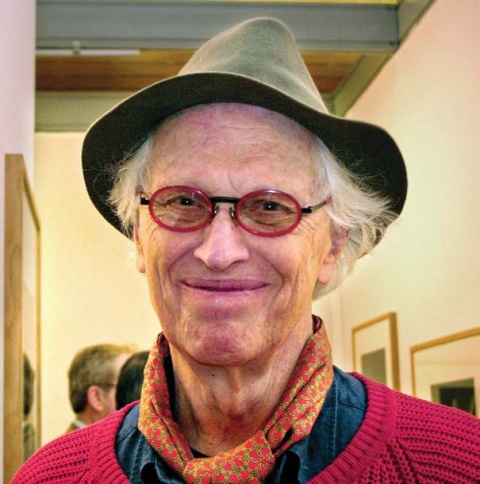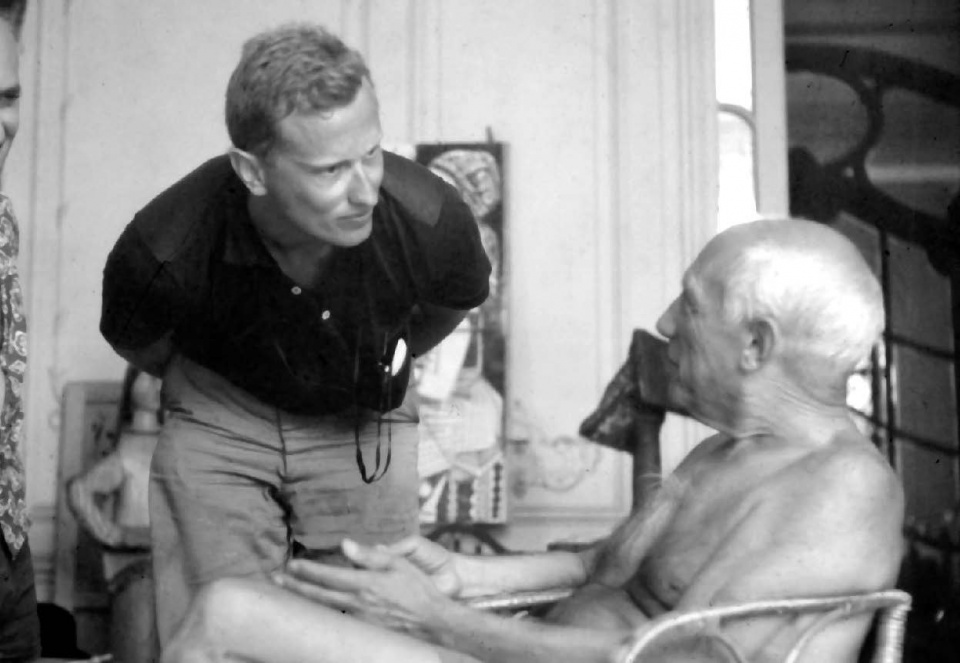Columbia College | Columbia University in the City of New York
A Meeting with Picasso Changed This Photographer’s Life

PHOTOS COURTESY FRED BALDWIN ’56
Armed with a friend’s Rolleiflex camera, Baldwin had laid siege to the artist’s villa in the South of France, sleeping in his car for three nights outside the gates and hoping to be let in. Finally, after being repeatedly rebuffed, Baldwin wrote a letter that appealed to Picasso’s sense of humor, and gained entry. He photographed the famed painter and came away with his life’s mantra: Dream. Use your imagination. Overcome fear. Act.

Baldwin adopted his life’s mantra after meeting Picasso in 1955: “Dream. Use your imagination. Overcome fear. Act.”
Baldwin’s work began as a hobby while a Marine in the Korean War (he matriculated at the College after returning stateside). Despite his heroism — he was awarded two Purple Hearts — Baldwin confesses he had been a “spoiled, conflicted, confused” person until mustering the courage to meet Picasso.
His fear gone, he took charge of his life. In the late 1950s and early 1960s, he tracked polar bears, witnessed wild horse round-ups and went underwater to photograph marlin in the Pacific and cod in the Arctic Sea for publications such as National Geographic, Sports Illustrated, Esquire and LIFE.
His philosophy of taking great wildlife pictures was simple: “I wait for something that reveals something special to me, those peak moments that rise to the occasion, so that then I go ‘click,’” he says.
But Baldwin, a Georgia native and son of an ambassador, felt something was wrong. “I was on a massive ego trip as a journalist. I was doing it for somebody else, not for myself,” he recalls.
A chance encounter with a Civil Rights march in Savannah in 1963 changed his life. For the next two years, he volunteered to photograph events for Hosea Williams, a member of Martin Luther King Jr.’s inner circle, for the Chatham County Crusade for Voters newspaper. “I found myself working in a spirit that drew on conditions that I had observed and experienced, but now I was surrendering my secret God-given white self-importance. That was new,” he says.
Baldwin’s life evolved further when he joined the Peace Corps. He supervised 180 volunteers in Sarawak (present-day Borneo), and traveled to India, Malaysia and Afghanistan to document volunteers’ work there.
Back home, Baldwin focused his lens on poverty in rural Georgia and South Carolina, work that resulted in a $600,000 federal grant for a health clinic. He and his wife moved in 1971 to Texas, where they spent years living in a 13-ft. trailer for a photo/oral history project with the rural poor in two counties. The venture, funded by the National Endowment for the Humanities, resulted in exhibitions at the Smithsonian and nearly a dozen other museums, and in the 1991 book Coming to Terms: The German Hill Country of Texas.
Looking back on his life, Baldwin says, “I’ve learned from pain and success and failure. You have to take those things and figure out how to put them to work. Even at 92, every day I worry about finishing all the jobs I have,” he says.
He recently became obsessed with a crumpled tube of toothpaste. “I kept trying to get one more drop out,” he recalls. “I’d squeeze it and get a bit more. That’s a symbol of what you have to do with your life — you’ve got to squeeze it until you get the last drop out.”
[Editor’s note: Baldwin died on December 15, 2021, as this issue went to press. An obituary will be published in the Spring/Summer 2022 issue.]
George Spencer is the former executive editor of Dartmouth Alumni Magazine. He lives in Hillsborough, N.C.
Issue Contents
Published three times a year by Columbia College for alumni, students, faculty, parents and friends.
Columbia Alumni Center
622 W. 113th St., MC 4530, 4th Fl.
New York, NY 10025
212-851-7852
cct@columbia.edu
Columbia Alumni Center
622 W. 113th St., MC 4530, 4th Fl.
New York, NY 10025
212-851-7488
ccalumni@columbia.edu

